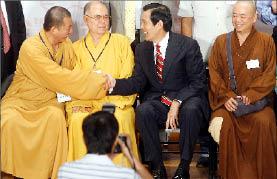President Ma Ying-jeou (馬英九) yesterday touted his love for Taiwan and his efforts to secure the nation’s sovereignty, insisting that his proposed peace agreement with China is aimed at establishing long-term cross-strait peace.
In an interview with the talk show Report to the Voters on CTV, Ma bemoaned the Democratic Progressive Party’s (DPP) continuous challenges over his pro-China stance following his recent proposal to sign a peace agreement with China, saying that he should not carry “original sin” just because his parents came from China.
“Your hometown is where you bury your family members. My grandparents, my father and my uncle are buried here. I love Taiwan deeply because Taiwan is my home and no one should doubt my love for Taiwan,” he said.

Photo: CNA
Discussing his cross-strait policies in the hour-long interview, Ma reiterated that key to his proposed peace pact is systemizing the “status quo” across the Taiwan Strait.
The two sides of the Strait maintain the “status quo” of the “three noes” — no unification, no independence and no use of force — and the proposed peace agreement was based on the principle of “no use of force,” Ma said.
He insisted that former presidents Lee Teng-hui (李登輝) and Chen Shui-bian (陳水扁), as well as DPP Chairperson Tsai Ing-wen (蔡英文), had proposed similar mechanisms to maintain cross-strait peace and his efforts should not be distorted as a move toward unification.
“We will be extremely cautious when promoting any of the policies mentioned in my ‘golden decade’ visions and, as I said, the government will not promote a peace pact without domestic support,” he said.
Domestic support for the peace pact would be determined through a referendum, he said.
Ma added that if he is re-elected in January’s presidential election, he would not take the victory as support for his proposed peace agreement, and he dismissed concerns that the Ma camp is attempting to turn the presidential election into a peace agreement referendum.
Signing a peace agreement with China was one of the proposals Ma outlined for what he called a “golden decade,” one of the pillars of his re-election campaign platform.
When asked about the time frame for signing a peace agreement with China, the president said it was unlikely that a cross-strait peace pact could be promoted during his second term, if he is re-elected, as the nation is still living in a bipartisan political environment.
“However, as the president of the nation, I need to consider the future of our next generations and be prepared for the issues the nation will face in the next decade, including long-term peace across the Taiwan Strait,” he said.
He also dismissed the DPP’s criticisms of his golden decade visions as a “one-man decision” and said that the contents of the visions were presented only after cross-departmental discussions.

PRAISE: Japanese visitor Takashi Kubota said the Taiwanese temple architecture images showcased in the AI Art Gallery were the most impressive displays he saw Taiwan does not have an official pavilion at the World Expo in Osaka, Japan, because of its diplomatic predicament, but the government-backed Tech World pavilion is drawing interest with its unique recreations of works by Taiwanese artists. The pavilion features an artificial intelligence (AI)-based art gallery showcasing works of famous Taiwanese artists from the Japanese colonial period using innovative technologies. Among its main simulated displays are Eastern gouache paintings by Chen Chin (陳進), Lin Yu-shan (林玉山) and Kuo Hsueh-hu (郭雪湖), who were the three young Taiwanese painters selected for the East Asian Painting exhibition in 1927. Gouache is a water-based

A magnitude 4.1 earthquake struck eastern Taiwan's Hualien County at 2:23pm today, according to the Central Weather Administration (CWA). The epicenter of the temblor was 5.4 kilometers northeast of Hualien County Hall, at a depth of 34.9 km, according to the CWA. The earthquake's intensity, which gauges the actual effect of a temblor, was the highest in Hualien County, where it measured 2 on Taiwan's 7-tier intensity scale. The quake also measured an intensity of 1 in Yilan county, Taichung, Nantou County, Changhua County and Yunlin County, the CWA said. There were no immediate reports of damage or injuries.

‘WORSE THAN COMMUNISTS’: President William Lai has cracked down on his political enemies and has attempted to exterminate all opposition forces, the chairman said The legislature would motion for a presidential recall after May 20, Chinese Nationalist Party (KMT) Chairman Eric Chu (朱立倫) said yesterday at a protest themed “against green communists and dictatorship” in Taipei. Taiwan is supposed to be a peaceful homeland where people are united, but President William Lai (賴清德) has been polarizing and tearing apart society since his inauguration, Chu said. Lai must show his commitment to his job, otherwise a referendum could be initiated to recall him, he said. Democracy means the rule of the people, not the rule of the Democratic Progressive Party (DPP), but Lai has failed to fulfill his

OFF-TARGET: More than 30,000 participants were expected to take part in the Games next month, but only 6,550 foreign and 19,400 Taiwanese athletes have registered Taipei city councilors yesterday blasted the organizers of next month’s World Masters Games over sudden timetable and venue changes, which they said have caused thousands of participants to back out of the international sporting event, among other organizational issues. They also cited visa delays and political interference by China as reasons many foreign athletes are requesting refunds for the event, to be held from May 17 to 30. Jointly organized by the Taipei and New Taipei City governments, the games have been rocked by numerous controversies since preparations began in 2020. Taipei City Councilor Lin Yen-feng (林延鳳) said yesterday that new measures by